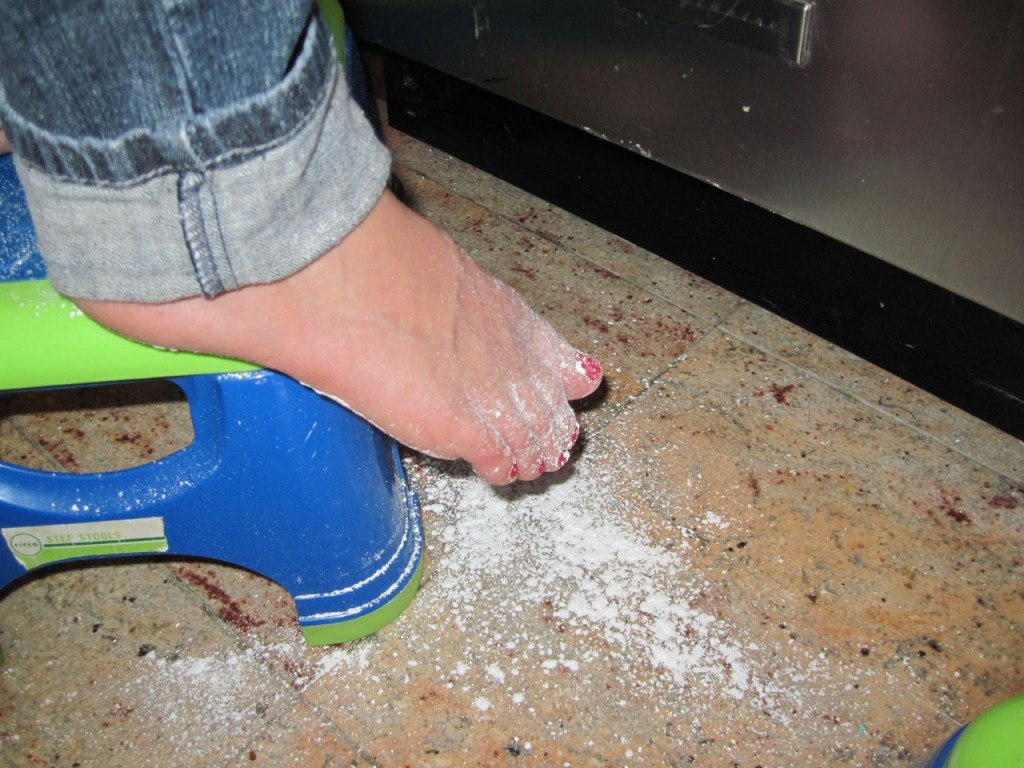Actually, it should be obvious why it doesn’t work. I don’t really have to explain it, do I? What I will point out is how many schooled children, despite what the school might say, are being taught exactly that method of learning.
Here are some examples: Maya’s art teacher also teaches after school classes. She told me once how much she enjoys the homeschoolers, because they are always ready to leap into a new technique and are not afraid of making mistakes. She told me that the students most afraid of trying something new are the private school kids, followed by the public school kids. Her theory was that because the pressure to perform at the private schools is so great, students become fearful of any type of mistake, even when it’s made clear that mistakes are ok and even welcomed. As the sign on the art studio wall says, “Practice makes progress.”
A recent Times article told of families spending upwards of 40K a year on private tutoring to ensure their child outperforms every other kid in a given subject. Fear of not being accepted to the ‘best’ schools is the impetus. And of course the social embarrassment that would go along with said failure to be accepted.
Let’s jump ahead a few years, and see what effect this method has once you are grown and out in the world: My mother is preparing to semi-retire. She runs a billing office for a group of anesthesiologists. The women who work there with her, both of whom are at least 20 years younger and have worked there for upwards of 10 years, were offered the position. Both of them declined. Why? They didn’t want to take responsibility for the job. The are happy to follow orders and do the work, but they don’t want to be the one in charge. This is the result of our factory schooling system.
Then there is the ‘cool’ factor. Children of 11 & 12 refusing to play because it might not be cool. The over-awareness of what others might think of how they look, what they wear, what they do.
Today’s NY Times had an entire section on the search for a summer job by teens in various parts of the country. At the top of the first page was an anecdote about Steve Jobs:
Steve Jobs likes to tell how his own career in computers was shaped by a lucky summer job. Fascinated by electronics and already brash at age 13, he looked up Bill Hewlett, of Hewlett Packard in the Palo Alto telephone book and called him. They talked shop, and the boy ended up putting in screws on an HP assembly line. His first day, he later said, was “bliss”.
It is an archetypal American story, the summer job that helps a teenager save for a car, clothes or college, that provides a first taste of the workaday world and sometimes even a crucial steppingstone.
But the venerable rite is also an endangered one: between a historic decline in short-term jobs for teenagers and the listing economy, only one in four youths ages 16 to 19 is expected to find work this summer, made more difficult for low-income teens by shrinking federal job subsidies.
I take issue with this little anecdote for a couple of reasons. First of all, Steve Jobs got that job because he took the initiative and did something no one else would do. There was nothing ‘lucky’ about it. He didn’t show up at the factory, ask for an application and say, “Hi, I’m 13 and I love electronics. Can I work on the assembly line?” And by the way, the Times conveniently forgets to point out that at 13, he was not of legal age to work a full time job, making that story even more an instance of a kid totally breaking the mold to follow his own path. And as we all know, Jobs didn’t finish college. What part of that story has anything to do with most 16-19 year olds today, who might believe factory work to be beneath them, based on the propaganda they’ve been fed?
The Times then goes on to give a modern example of Steve Jobs-like initiative, in a young man named Cameron Stephens from Atlanta who decided he wanted to work at a local organic farm. Instead of applying for a position, he just started showing up every day and working, unpaid, until a supervisor noticed and cornered him. The owner of the farm promptly offered him work and became a mentor to him. The work he does is hot, hard and honest. The Times, however, in a sentence that sounds embarrassingly elitist, says, “The work is sometimes degrading – he has dressed in full-body costumes as a tomato, a strawberry and a carrot to advertise the market.” Excuse me? Degrading? Here’s a kid who went out, took the initiative and got a job at a place he thought “seemed like a cool place to work” – how dare the reporter call it degrading! (I’m looking at you, Robbie Brown.)
Mr. Stephens is the exception, which is no surprise considering even the article written about him calls his work degrading. Gee, talk about making a great case for others to show similar initiative!
So while the Dept. of Ed likes to talk about encouraging tomorrow’s leaders and improving public schools, the truth is that those massive factories are churning out fearful followers whose only goal is to do the prescribed work better than anyone around them in the vain belief this will somehow make them extraordinary. They believe this, because while they are chastised for the smallest mistake, they are also told that good grades mean they are better than everyone else. They believe manual labor is menial and beneath them, even though that is what they are really trained for, in one form or another.
My kids aren’t perfect and neither are our lives, but at least they aren’t afraid of making mistakes. Sometimes they have the most fun when making mistakes, and then they figure out how to fix them or alter what they were doing to accommodate the mistake. They also learn happily, when and what they want, and I have to believe this is going to serve them well in a world where most people are ruled by fear. And it’s not just my kids; these traits are common among the homeschooled and life learners we know and probably also those we don’t.
So “Bravo!” to Mr. Stephens, schooled and the son of a single mother, for not following the rules. He may have found the surest way to success.

